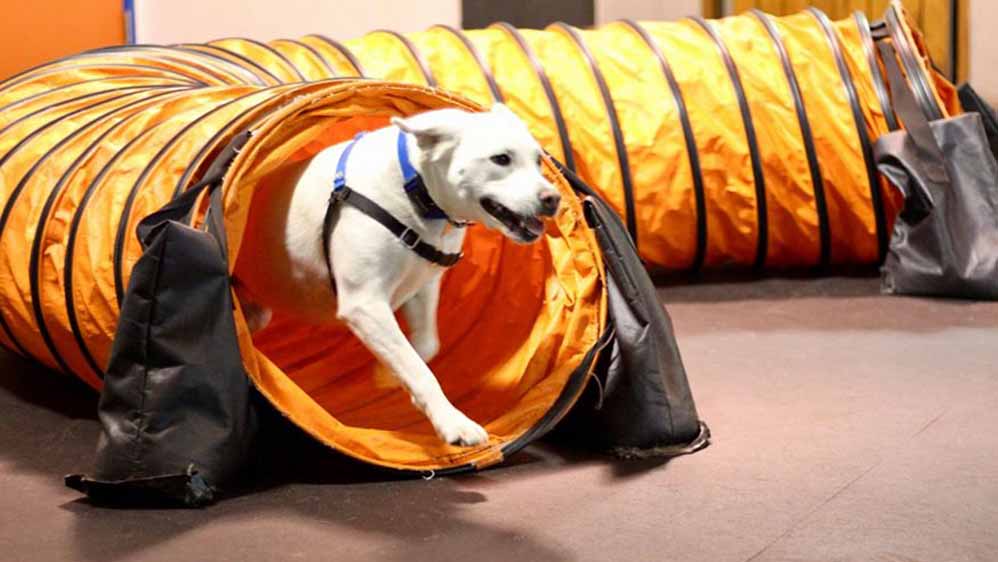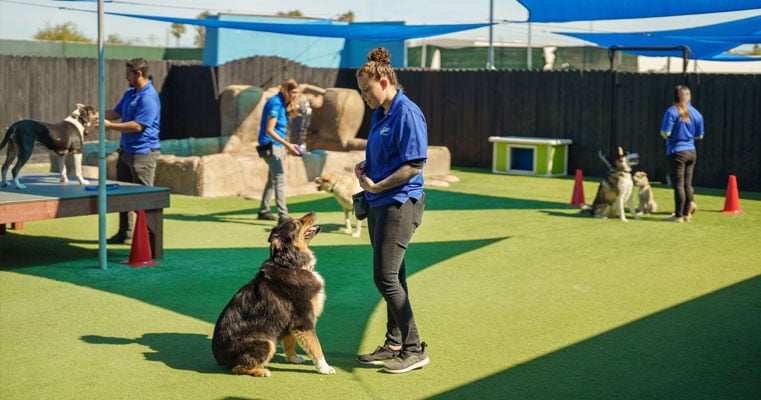Unleash Potential with Dog Training Near Me: Locate Your Local Professionals
Unleash Potential with Dog Training Near Me: Locate Your Local Professionals
Blog Article
Unlock Your Pet dog's Potential: Proven Dog Training Methods for Success
Efficient dog training is a nuanced process that pivots on understanding canine actions and using scientifically backed approaches. By incorporating favorable reinforcement, establishing clear commands, and prioritizing socializing, dog proprietors can grow an efficient partnership with their pet dogs.
Comprehending Pet Actions
Comprehending pet actions is essential for effective training and fostering a positive relationship in between dogs and their proprietors. A comprehensive understanding of canine body movement, vocalizations, and social interactions is essential for identifying their requirements and feelings. Dogs connect mostly via non-verbal signs; for instance, a wagging tail might show enjoyment, while pinned ears can indicate fear or submission.

Furthermore, environmental variables play a substantial function fit a canine's actions. Adjustments in routine, brand-new surroundings, or the existence of strange people can bring about stress and anxiety or anxiousness in pets. Identifying these triggers makes it possible for owners to alleviate damaging responses and develop suitable training techniques.
Eventually, a deep understanding of pet dog behavior lays the structure for effective training approaches, enhancing both behavior and the general bond in between the pet and its owner. dog training charlotte nc. This expertise is important for fostering a well-adjusted, pleased canine friend
Favorable Support Methods
Effective training counts heavily on positive support techniques, which have actually been revealed to yield significant lead to shaping desired actions in pets. This strategy includes awarding a pet dog for displaying certain habits, therefore enhancing the probability that these behaviors will certainly be repeated. Benefits can take numerous types, consisting of treats, praise, toys, or play, depending upon what inspires the private canine.

It is necessary to slowly phase out incentives as the pet dog learns the actions, transitioning to intermittent support. This approach maintains the behavior with time while preventing reliance on consistent incentives. By focusing on positive support, instructors can grow a relying on connection with their canines, promoting a participating and healthy and balanced training setting that enhances general obedience and efficiency.
Developing Regular Commands
An essential facet of effective canine training is the facility of constant commands. Consistency in commands is essential for reliable interaction between the pet and the trainer. When commands are uniform, pets discover to connect specific words with desired habits, which accelerates the training process and enhances understanding.
To develop consistent commands, it is essential that all relative utilize the exact same terms and motions. As an example, if a single person utilizes "rest" while another states "rest down," it can develop confusion for the canine. Select clear, distinctive words for commands and make certain every person associated with the canine's training abides by these selections.
Additionally, rep is key. Strengthen commands through regular technique, making sure that the dog receives adequate possibilities to respond correctly. When a dog successfully follows a command, immediate positive support ought to follow. This can be in the form of deals with, praise, or play, solidifying the link between the command and the action.
Lastly, hold your horses. Establishing consistent commands requires time and effort. With devotion and clarity, you will assist your dog establish a strong understanding of expectations, ultimately causing a well-behaved companion.
Socializing and Direct Exposure
Mingling a dog is crucial for cultivating a confident and well-adjusted buddy. This process involves revealing your canine to a range of settings, individuals, and other pets to develop their social skills and versatility. Early socialization, preferably in between the ages of three to fourteen weeks, is critical, as it prepares for a dog's future actions.
Throughout socialization, aim to offer favorable experiences in different setups, such as parks, active roads, and homes with various other pets. Present your pet dog to numerous stimuli, consisting of noises, views, and smells, guaranteeing that each encounter is gratifying. This direct exposure assists alleviate anxiety and stress and anxiety, leading the way for an extra resistant canine.
Taking part in controlled group play sessions with various other canines why not look here can additionally enhance social skills, showing your pet proper interactions and limits. Always check your pet dog's comfort degree throughout these experiences, slowly increasing exposure as their confidence expands. Keep in mind, the objective is to produce an all-around pet dog that thrives in varied scenarios, promoting an unified relationship with both humans and other pets. Prioritizing socializing will substantially add to your pet dog's overall happiness and actions throughout their life.
Overcoming Common Educating Obstacles
One more constant problem is distraction. Pet dogs may battle to focus in strange or hectic settings. Slowly desensitize your canine to disturbances by starting training in a peaceful atmosphere and slowly introducing even more stimulations as they end up being efficient (dog training near me). Positive support methods, such as treats and praise, can keep motivation and emphasis.
Furthermore, behavior concerns like jumping or extreme barking can end up being frustrating. Address these by instructing alternate habits, such as resting calmly when greeting guests. Consistency and patience are vital; enhance wanted behaviors continually and stay clear of abuse, which can lead to confusion.
Last but not least, identify that each pet is special, and training timelines might vary. Tailor your method to your pet dog's individual demands, and seek professional guidance if essential. With perseverance and the ideal approaches, getting rid check my site of these obstacles can lead to a trained, happy canine companion.
Verdict
In verdict, opening a dog's prospective demands a comprehensive approach that includes an understanding of canine habits, the application of positive support techniques, and the establishment of consistent commands. Early socialization and exposure to diverse atmospheres better boost a pet dog's adaptability and self-confidence. By attending to usual training difficulties with tailored methods and perseverance, a participating and unified relationship between pet dog and handler can be promoted, inevitably resulting in a well-behaved friend with the ability of thriving in numerous scenarios.
Effective canine training is a nuanced process that pivots on recognizing canine actions and using clinically backed strategies.Comprehending pet dog habits is vital for effective training and cultivating a positive connection between pets and their proprietors.Effective training counts greatly on positive support methods, which have been shown to produce considerable results in forming preferred behaviors in canines. When commands are uniform, dogs discover to connect specific words with preferred behaviors, which speeds up the training procedure and enhances understanding.
In conclusion, unlocking a canine's potential requires a comprehensive technique that includes an understanding of canine behavior, see here now the application of favorable support methods, and the establishment of consistent commands.
Report this page